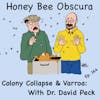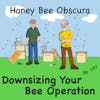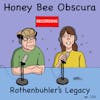Dealing With Seasonal Bee Management Fluctuations (132)

How does a beekeeper deal with the seasonal population shifts, weather and resulting needs of the honey bees in their care. How does a beekeeper balance the needs of the colony with the needs of the beekeeper? The middle of that Venn Diagram is a very...
 How does a beekeeper deal with the seasonal population shifts, weather and resulting needs of the honey bees in their care. How does a beekeeper balance the needs of the colony with the needs of the beekeeper? The middle of that Venn Diagram is a very small slice of common interests. Mostly, the bees and the beekeeper are at odds of what that intersection should include.
How does a beekeeper deal with the seasonal population shifts, weather and resulting needs of the honey bees in their care. How does a beekeeper balance the needs of the colony with the needs of the beekeeper? The middle of that Venn Diagram is a very small slice of common interests. Mostly, the bees and the beekeeper are at odds of what that intersection should include.
In today's episode, Kim and Jim examine this conundrum of needs and expectations - the balance-point of which changes constantly, based a multitude of seasonal variables.
Listen in as Kim and Jim sort of the details to find an approach that has worked for them. What works for you?
Let them know!
______________________
Thanks to Betterbee for sponsoring today's episode. Betterbee’s mission is to support every beekeeper with excellent customer  service, continued education and quality equipment. From their colorful and informative catalog to their support of beekeeper educational activities, including this podcast series, Betterbee truly is Beekeepers Serving Beekeepers. See for yourself at www.betterbee.com
service, continued education and quality equipment. From their colorful and informative catalog to their support of beekeeper educational activities, including this podcast series, Betterbee truly is Beekeepers Serving Beekeepers. See for yourself at www.betterbee.com
______________________
Honey Bee Obscura is brought to you by Growing Planet Media, LLC, the home of Beekeeping Today Podcast.
Music: Heart & Soul by Gyom, All We Know by Midway Music, original guitar music by Jeffrey Ott
Copyright © 2023 by Growing Planet Media, LLC

Episode 132 – Dealing With Seasonal Bee Management Fluctuations
Kim: Jim, it's good to see you again. We haven't been talking much lately and it's good to get back together. I got to tell you, I sat down here this morning and I took a look and the first thing that caught my eye was my calendar, and summer is here.
Jim: Yes it is. The spring season of 2023 will soon be history in the next day or so.
Kim: Hi, I'm Kim Flottum.
Jim: I'm Jim Tew. We're coming to you from Honey Bee Obscura where today we want to talk about the seasonal variations that bees go through and their annual population increase and decline. I think it's safe to say is a messy topic, Kim.
Kim: Because part of the topic is what do we do to change their minds and try to make them do something else that's in favor of beekeeping as opposed to a beehive.
Introduction: You are listening to Honey Bee Obscura, brought to you by Growing Planet Media, the folks behind Beekeeping Today podcast. Each week on Honey Bee Obscura hosts Kim Flottum and Jim Tew explore the complexities, the beauty, the fun, and the challenges of managing honeybees in today's world. Get ready for an engaging discussion to delight and inform all beekeepers. If you're a longtimer or just starting out, sit back and enjoy the next several minutes as Kim and Jim explore all things honeybees.
Jim: Kim, I was aware that I was behind as usual. I don't want to complain, but the season always gets away from me. The thing is, the season does not get away from the bees. This is a messy topic. I need to just prepare the listeners for that. There's so many variations, there's two games in play. There's the bees doing their own thing. If we don't work with them, then there's us doing our management schemes that changes all those interactions. Everything is in detail and it causes confusion when you're trying to discuss this annual population cycle of increase, maximum level, and then decline. Help me with that, Kim.
Kim: I got to refer to a saying that's real popular, what's good for the bees usually isn't good for the beekeeper, and what's good for the beekeeper usually isn't good for the bees. What you just said was that the bees have a plan and we have a plan and seldom are they the same. What do we want that causes the least disruption for the bees so that as beekeepers, we do what we want to do, which is keep them alive, keep them fed, keep them happy, keep them home, while at the same time not disrupting them to the point where they're going to say, "Hey, we're out of here. This guy's crazy."
Jim: That is the ultimate insult, isn't it Kim? That you're out there doctoring your bees, taking care, worrying, paying high prices for queens to have the bees with their communal mind decide, "This is not for us," and they abscond, and then that starts the game all over again. Then they go to this new home site, wherever it might be, and start building populations and accumulating numbers and getting back into their own seasonal cycle without us. That's the ultimate insult.
Kim: Even if they don't abscond if they just continue to put up with us, I guess is a way to look at it, what is it that we want to do that's the first day of summer or real close, and we've got to go until essentially the first day of winter now and keep that colony both happy and thriving and healthy, but at the same time, I got be sitting out there that I need to work with to harvest honey, harvest pollen, all of those other things so that I can afford to pay for more bees next year. It's a tug of war. We want something, they want something and what can we settle for that'll keep both of us unhappy but home?
Jim: When you were describing all that, I was thinking that Kim, you're describing your game, you're describing your sight of the beekeeper bee interaction, because what the bees want really is not that. They want to make just enough honey to survive. They want a much smaller population and they want to swarm as often as they can, and few parts of that are in our game plan. I agree with you, where is the interface? We basically want to be the bees' friends and they seemingly have no interest in being our friends. They just want to be left alone.
Where the beekeeper comes in is trying to control varroa, trying to keep the queen in place, trying to keep the populations healthy and vigorous, and to watch for other pests and other issues. Most of that is not in the bees' game plan. They just want to be left alone, harvest, swarm, rob, survive and get through the winter and start all over again.
Kim: Beginning of summer, what are bees thinking right now? They're thinking, it's time to start winding down. The spring flow is pretty much over, there's still some summer flow coming up. We can take advantage of that, but at the same time, we got to get through winter down the road and a huge population, which we would have if we took a big advantage of early summer flow would be less than perfect for that winter plan of reducing the population and all of the demands that requires. From a bee's perspective, I'm looking slower. From a beekeeper's perspective, I'm looking at let's go girls, we need more and more and more.
Jim: I just can't believe, Kim, that right now my bees are their highest population for this year. From this point on, just like the summer solstice, they're going to begin to decline. The days are going to get shorter and the bee populations are going to decline as they approach that reduced winter population level. What I want to do right now is to keep them as healthy. I want to try to do everything I can to short-circuit their natural interest in late-season swarming. I want to keep a good queen disease-free inside the colony so they can finish up what's left of the clover flow in the late-season nectar, so it says that are still there. That's my game plan. It's not necessarily the bees' game plan in all ways.
Kim: From what I know and what I've learned and what I've observed over almost 40 years of watching bees do what bees do, that old saying, bees are going to do what bees are going to do, pretty much rules the day. I want them to coast at a plateau a little bit higher than they do for the rest of this summer flow, and then they can close down quicker come fall, but they don't do that. It's a slow natural decline in population and food production and brood production and in nest construction, all of the things that I'm looking at to stay where it's at or even increase, they're looking at to say staying at or decrease. Am I right?
Jim: I think you're right. I completely agree with that. In many ways, can I say that beekeeping is like gardening? You got to have vast amounts of patience. You do something and then you wait and sometimes weeks. I wait for a plant to grow, I wait for the bees' population to slowly decline. I want a quick fix, I want to do something, and bam, I want to see some result from it, but most of the time in beekeeping you make a change and then you wait for that change to be implemented by the bees.
Kim: The changes that I've made considering my observations of what bees are going to do is that right now the bees that I have out in my backyard, I have already-- If they had extra honey, I've harvested the honey that they won't need for winter. They need about 40, 50 pounds to get through winter and I always leave them that much. I've harvested some honey and if I don't get any more the rest of the season, the bees and I are going to be happy because they got enough and I got something.
Jim: That worked out well for both of you. That worked out well. I guess that seems fair to me, but I guess the bees might have a different opinion. Kim, this is a good place to take a short break, hear from our sponsor.
Betterbee: At Betterbee, we know you have many options for where you choose to get your wooden hive boxes and frames. We work closely with our sister company, Humble Abodes in Maine to bring you high-quality wooden wear featuring tight-fit assembly available in a variety of grade options to meet your needs. Whether you choose select commercial or budget-grade boxes or frames, you can count on quality milling of locally sourced eastern white pine. Shop all wooden wear at betterbee.com.
Jim: One of the things that should be done now you can take off some honey. That's part of my game plan is I pumped the bees up, I kept them from swarming, I encourage them, I stimulative fed them, and now I would take some of the honey for myself and that would be my reward. I've got some pollination value out of this. I've certainly got some enjoyment value out of it, and I've got some frustration value out of it when things don't go right.
I'm basically chasing after the seasonal cycle and the bees are always in front of me. Kim, I'd love to get off the subject and say, where is the decision makers inside the colony? Who's the timekeeper inside the colony? I don't know if it's a communal mind of all the bees together or if house bees are controlling brood rates and whatever, but that communal mind is on the money every year. The bees know what to do with it.
Kim: It doesn't change much. Let me rephrase that. It changes to the point where the bees will act differently if survival depends on it. If there's a significant severe drought, for instance, or 40 days and 40 nights of rain, for instance, that's going to change I'm going to say what they would like to do, but what I think nature says, this is the way you need to react normally. Now, the world has changed and you've got a problem and you got to figure out what to do because nothing's coming in because of the drought. Nothing's coming in because you can't fly in the rain. There's all of those parts of the problem too. In the meantime, I'm still trying to figure out how to get more honey out of them.
Jim: I completely agree. I admitted when we started this session that this is a messy topic because it's so fluid. If I make a change or if the bees make a change or if the weather makes a change, then all three of us or two of us, both the bees and us have to respond to whatever change has been implemented. It's never really fixed. We want beekeeping to be simple. We want 7 or 8, 9, 10 things on a list and if you do those things, you're guaranteed success. In reality, those 7 or 8 or 10 things are always suggestions that may or may not play a role in the seasonal cycle.
Kim: Good point. Suggestions. I like that. I'm going to throw somewhat of a curve in here because I've been doing a fair amount of reading lately. You take two steps back and I'm going to take a look at this hive and I'm going to say I am a natural beekeeper and I don't do anything to change their seasonal plan. As a result, they may not survive because drought, rain, mites, whatever. There's that niche out there that looks at this beehive that way. You and I aren't that way. We're not that natural naturally.
Jim: I can't disagree with that. My interest is usually what went wrong and how could I subsidize the bees or help them correct whatever mistake was thrust on them. I do tend to get involved in the bees' affairs too often mainly because, Kim, I just have no idea why. I just want to know the inner workings of their ways. Why they do what they do and I try as I might, after all these years of keeping bees, I still don't speak bee very well. There's always a mystery to me. The bees know how to find water during that drought you're talking about. The bees know how to find nectar. They know how to find their neighbors to rob from them. They know how to find their way home. I just take the simplest route because that's all I can take.
I don't know how they do it, but they're going to go out there and they're going to find nectar and they're going to bring it back. They're going to bring back water. They're going to swarm if you don't watch this whole thing. I just find great personal satisfaction in trying to understand what they're doing. I want to admit that I was surprised that it's already the summer solstice and we're beginning to look at this year slowly ebbing out toward our fall nectar slow and then right headlong into winter and it's all over again. You wait all year for spring and then, poof, it is over.
Kim: I guess probably the takeaway, what I take away from this is if you're going to have bees, you're going to be a beekeeper, you want bees out in the backyard, the first thing you need to know is what do bees do, what do they need. Then once you know what they need, how do they get what they need? They know what they need and they're going to go looking for it or make it or they're going to obtain it somehow. If they don't, that's when I step in.
I try to keep out of their way mostly but if I know that they need more nectar right now in the spring and there isn't any because there's a drought or whatever, then I can step in and say, "Okay, you can't get nectar out in the field, but I can give you some sugar syrup here or maybe some extra honey that I've saved," and mostly keep out of the way. Does that make sense?
Jim: It does make sense. Can I tell you a short story about what happens when you don't stay out of their way? About 10 years ago I thought this is going to be my maximum year. I'm going to push the bees, I'm going to help them be all they can be. I fed them intensely sugar syrup, I put on pollen kicks, and ended up getting a lot of small eye beetles because of that but I provided pollen for them and I really built those colonies up strong. They looked good, those that didn't swarm.
Kim, you know what happened? Those that didn't swarm did swarm really late in the year. That year I had a remarkable number of really late-season swarms. Here I go trying to figure out what happened. Was that just the bees' effort to get rid of all those surplus bees, that their schedule was off, their timeframe was off? We have too many bees in September to go into winter with all this, the winter store consumption's going to be excessive. This was just me trying to think like a bee.
What in the world were they thinking casting a swarm as late as early October? It had no chance of surviving and the thing that was infuriating was that the new queen back in the colony had really a minimal chance of getting mated and getting reestablished before winter was all over them. I conjectured that I threw off their annual cycle by keeping them pumped up so long. Yes, that's a long rambling story to say that I agree with you. Try to help the bees in ways they need helping and then just let them be bees on their own, stay out of their way. Most of the time we don't bee keep, most of the time we think about beekeeping.
Kim: I think that's about exactly right. Know what they need, know when they need it, and only step in when something out of their control gets in the way and they can't get what they need and they can't get what they want or they can't figure out how to do it. I think our role here is support as opposed to command.
Jim: Yes. That's a good way of putting it, Kim. That's a good way of putting it. We support what they need, but we really can't make them be something that we want them to be. We can only help them be what they need to be. This sounds kind of sappy. It sounds kind of dramatic, but it's all part and parcel of beekeeping. Years ago, years ago, years ago, Kim, I got my colonies built up in the spring and they were growing and somewhere probably right about late June, early July, I could clearly see that that population was maxed out and declining. I went crazy.
I'm a new beekeeper, I'm responsible for these bees, their destiny depends on me so I tried to feed them. I had the inspector come out and look for diseases. What is wrong with this colony? It's declining. It was right on schedule doing what it should be doing. I was just a new beekeeper and I was panicky because I thought that bees would just grow, grow, grow, grow, grow throughout the season and they did not. Those populations fluctuated and varied in correlation with the environmental requirements that were there.
Kim: I think the take-home message from this, all of this that we've spilled out on the floor here is I'll go back to be, I want to-- I don't know, do you define successful as keeping your bees alive or do you define successful as harvesting lots and lots of honey. If your definition is lots and lots of honey, you're going to be arguing with the bees most of the season. If keeping them alive, supplying what they need when they need it, and fixing what's broken when they break it keeps them alive, you get some honey, they get some honey, and next season, they're still here, I'm kind of looking at that being a better way to keep bees.
Jim: I'm kind of there with you. I realized that there are beekeepers who want to make all the honey they can and they have to look at this conversation in a different way. They would have different expectations but at my age where I am right now, I just want to enjoy the bees, have a nice time, supplement them wherever I should, and then leave them alone most of the time.
Kim: Well, it's almost the first day of summer. I'm going to go out and leave my bees alone today.
Jim: I'm actually on the road, Kim, as you know, so I'm going to depend on you to go harass your bees while my bees get a few days off.
Kim: Okay, well, travel safe.
Jim: I enjoyed talking to you.
[00:21:03] [END OF AUDIO]
New to Honey Bee Obscura Podcast?
Here are some great episodes to start with. Or, check out episodes by topic.













